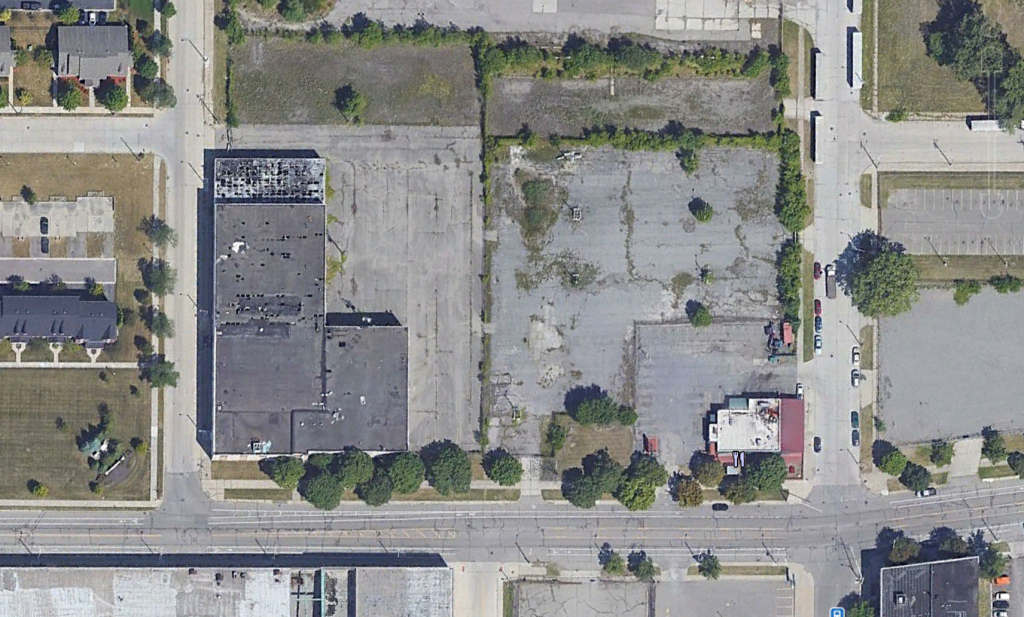The Morouns Tore Down A Warehouse For More Truck Parking. Really. [EDITED]
Walking from home to Corktown last night in search of food and drink with some out-of-town visitors who were eager to check out the neighborhood, we ended up walking down 16th St. Once upon a former life, I worked for Southwest Solutions, which is responsible for the development of a lot of the scattered-site infill development in this neighborhood. It’s vinyl-sided and it’s frankly pretty ugly, but it’s reasonably energy-efficient and reasonably high-quality housing. It’s preferable to vacant lots.
If Not Now, When? Detroit Flooding Raises Questions.
Certainly, it’s preferable to having just, well, a sea of truck parking. Such is quite popular in Southwest Detroit, where the Detroit International Bridge Company, owner-operators of the Ambassador Bridge, and their affiliated real estate empire(s) of Crown Enterprises and Northern Border Transit, own dozens, if not hundreds, of lots. Most of these lots are hardscaped (impervious). And most are some version of utterly derelict. Many of them are being used for truck parking. Oh, also? A friendly reminder that parts of Detroit catastrophically flooded a couple of weeks ago because of how much hardscaping there is.
Why Is Detroit Giving Industrial Slumlords Like Moroun A Free Pass?
Drainage, you say?
It gets worse when you look at the extremely hard-to-find DWSD/GLWA billing data, which show– through an utterly haphazard assemblage of documents from which I was able to derive a nonzero amount of information- that these lots aren’t even being assessed for the appropriate drainage tax rates. I haven’t been able to actually create an accurate accounting of the appropriate billing numbers. Some accounts span multiple parcels, while other parcels have no apparent water accounts associated with them. Getting FOIA data from the DWSD is akin to the difficulty of extracting a discarded chicken bone from the maw of Jack, my 11-year old terrier-spaniel.
BSEED Vs. Everybody
Meanwhile, among the peasantry? I’m not going to say I’ve pulled a permit for every job I’ve ever done, by any means. Generally, though, it’s not because I have some 3-percenter, Ted Bundy kind of fear of the G-men, or whatever. It’s more like, if these MFs are going to come into my home and poke around, they’re definitely going to find more than one thing that they object to beyond that thing for which I’ve called them out.
I do not trust BSEED. I worked with these people. If they’re not going to enforce the city ordinances– which, in this case, involve basic issues of human safety and procedural stuff like, you know, making sure you’re taking the appropriate precautions and measures before creating a giant mess of a demolished building that probably includes some asbestos and lead. It’s really basic rule-following. Why are the rules enforced for normal people and not for the big guys?
[UPDATE] TJ Rogers from the District 2 office of the City of Detroit (Councilmember Castañeda-Lopez) got back to us with a copy of a record indicating that the Morouns apparently did have a permit– though there is no word on why it didn’t appear in the city’s open data portal when I looked before. There are, of course, plenty of gaping holes in the city’s information system, and this isn’t more apparent anywhere than in BSEED, a building department that spent beaucoup bucks on new 4G tablets for inspectors who, years later, are still using paper and pen. The permit language vaguely references lead and asbestos abatement, and photo documentation of the demolition in progress indicate that there was no containment being used if asbestos or lead were indeed (likely) present at the time.
We reached out to Warren-based Crown Enterprises, one of the major Detroit real estate entities of the Moroun Empire, to try and get a comment on this topic, and have not heard back.



